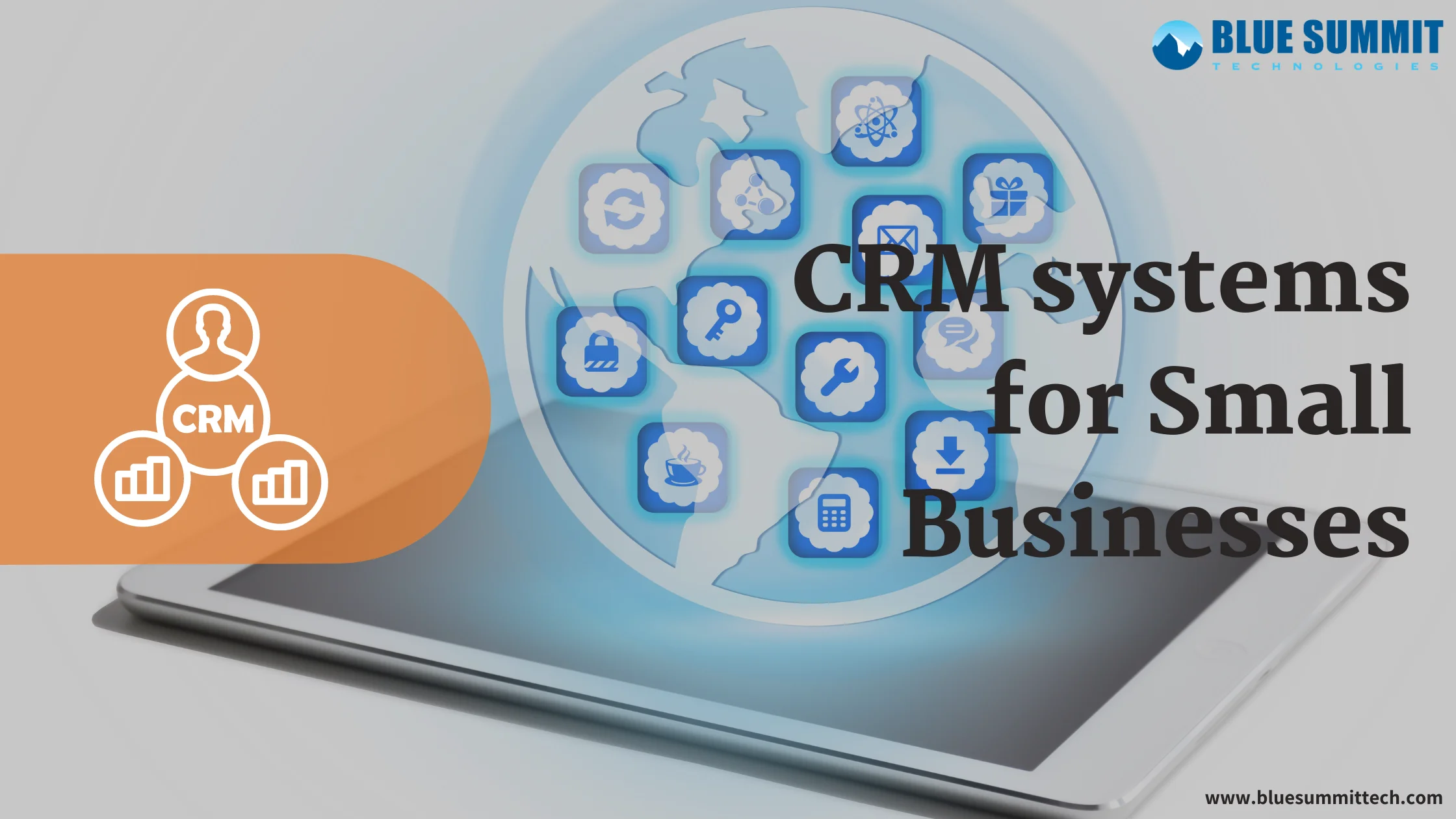
Posted on Thursday, Apr 11th, 2024
The Importance of CRM Systems for Small Businesses
Are you tired of feeling like you're constantly playing catch-up in the competitive world of small businesses? Imagine having a powerful tool at your fingertips that streamlines your operations and enhances your interactions with customers. This is where having a Customer Relationship Management (CRM) system comes to the rescue. CRM system becomes a game-changer for success. To achieve this, many have started using CRM tools for small businesses, which offer a wide range of tools that can help streamline operations and improve customer interactions.
You might think it's something fancy and unnecessary, but trust us, it's not. In fact, it's a must-have if you want to succeed in the small business game.
CRM and Its Core Properties
CRM, which stands for Customer Relationship Management, is a software that helps small businesses to manage a large amount of data, improve customer relationships, and simplify sales and marketing processes. It includes a set of practices, strategies, and technologies that help businesses to manage and analyse customer interactions throughout the entire customer lifecycle. The primary goal of CRM is to manage a company’s interactions with both current and potential customers, using data analysis to improve business relationships, increase customer retention, and ultimately drive sales growth.CRM properties encompass a wide range of functionalities, including contact management, sales management, productivity, and more. These properties ensure that every customer interaction is recorded and accessible, allowing for a personalized and efficient service.
CRM properties that make CRM systems indispensable for small businesses:
1. Contact and Lead Management
• Centralize and streamline the organization of lead and customer contact details.• Monitor every interaction, communication, and touchpoint with individual contacts to build a comprehensive engagement history.
• Automate follow-up reminders and strategically nurture leads to advance them through the sales funnel.
• Segment contacts effectively for targeted marketing campaigns, enhancing the relevance and impact of outreach efforts.
2. Sales Pipeline Tracking
• Gain a clear overview of the sales pipeline, tracking the journey of deals and opportunities from inception to close.• Assess the progression of leads at each stage, pinpointing areas for improvement or intervention.
• Utilize pipeline data to forecast sales trends and set realistic, achievable goals for the sales team.
3. Marketing Automation
• Simplify marketing operations by automating routine tasks, from email blasts to social media updates.• Tailor marketing initiatives to match customer profiles, ensuring content resonates with the intended audience.
• Evaluate the success of marketing campaigns with robust tracking tools, optimizing strategies for better lead conversion.
4. Customer Service and Support
• Centralize customer service operations, managing inquiries and support tickets from a unified platform.• Expedite issue resolution with efficient ticketing systems and escalation protocols.
• Empower customers with self-help resources like knowledge bases, enhancing their ability to resolve queries independently.
• Gather and analyse customer feedback to continually refine the service experience and boost satisfaction.
5. Analytics and Reporting
• Derive actionable insights from customer data, uncovering behavioural patterns and preferences.• Keep a pulse on vital metrics, including sales revenue, acquisition costs, and lifetime value, to inform strategic planning.
• Customize reports and dashboards for real-time performance monitoring, ensuring stakeholders stay informed and engaged.
CRM Integration in Small Businesses and Start-ups
CRM integration is the process of linking a Customer Relationship Management (CRM) system with other software application systems or platforms within a business ecosystem. Which enables seamless data flow between the CRM system and other business tools. Integration enhances efficiency, productivity, and effectiveness across various departments and processes.Examples of CRM integration include connecting with email platforms, marketing automation tools, sales automation platforms, customer support systems, e-commerce platforms, accounting software, and social media platforms. This integration ensures that all relevant data and communication of customer interactions are centralized within the CRM system, offering a comprehensive view of customer relationships. This centralized approach facilitates better decision-making and enables personalized customer interactions, ultimately improving overall business performance and customer satisfaction.
CRM benefits for Small Business
The benefits of CRM for small businesses are manifold. A well-implemented CRM system can lead to:1.Improved Customer Relationships
CRM systems are game-changing for businesses. They centralize data from various touchpoints, providing a comprehensive view of each customer. By leveraging this data, businesses can provide personalized interactions tailored to individual preferences and needs, resulting in stronger customer relationships. CRM systems facilitate consistent communication across all channels, fostering trust and reliability, which are crucial for building long-term customer relationships. Improved customer relationships lead to higher levels of satisfaction, increased loyalty, and enhanced trust, all of which are essential for driving success in a competitive market.2. Increased Sales and Revenue
CRM systems are essential for businesses as they streamline the sales process by providing lead and pipeline management tools. By tracking leads from start to finish, businesses can focus on high-potential opportunities. Real-time data provided by the CRM systems empowers sales teams to make informed decisions, identify trends, and adjust strategies accordingly. This data-driven approach leads to higher conversion rates, increased sales efficiency, and revenue growth. The systems also enable businesses to forecast sales more accurately by analysing historical data and identifying patterns and trends. This forecasting capability allows businesses to allocate resources effectively, optimize inventory levels, and capitalize on emerging opportunities. By utilizing CRM data, businesses can stay ahead of the competition and drive sustainable revenue growth over time.3.Enhanced Marketing Effectiveness
CRM systems provide valuable insights into customer preferences, behaviours, and demographics, which are essential for effective marketing campaigns. By segmenting customers based on these insights, businesses can create targeted campaigns that resonate with specific audience segments. This personalized approach not only increases the effectiveness of marketing efforts but also improves customer engagement and conversion rates.It streamlines marketing processes through automation, allowing businesses to execute campaigns more efficiently and at scale. From email marketing to social media advertising, CRM systems enable businesses to deliver the right message to the right audience at the right time. Additionally, it provides tools for tracking campaign performance and measuring ROI, allowing businesses to refine their strategies and optimize marketing spend for maximum impact.
4.Better Customer Service and Support
CRM systems empower businesses to deliver better customer service and support by providing access to comprehensive customer information. With a complete view of customer history, preferences, and interactions, customer service teams can resolve issues more efficiently and effectively. It enables businesses to implement self-service options such as knowledge bases, FAQs, and chatbots, allowing customers to find answers to their questions quickly and conveniently.CRM systems facilitate proactive customer service by enabling businesses to anticipate customer needs and address issues before they arise. By analysing customer data and identifying patterns, businesses can identify trends, predict potential issues, and take proactive measures to prevent them.
5.Data-Driven Decision-Making
CRM systems offer powerful analytics capabilities that enable data-driven decision-making across all areas of the business. By analysing customer data, sales trends, and market dynamics, businesses can gain valuable insights that inform strategic decisions and resource allocation. From product development to marketing strategy, CRM tools provide the data and insights needed to make informed decisions that drive business growth and success.CRM systems enable businesses to track key performance indicators (KPIs) and measure the impact of their decisions over time. By monitoring metrics such as customer acquisition cost, customer lifetime value, and churn rate, businesses can assess the effectiveness of their strategies and make adjustments as needed.
6.Increased Productivity and Efficiency
CRM systems automate repetitive tasks and streamline workflows, freeing up time for employees to focus on high-value activities. By eliminating manual data entry and administrative tasks, CRM enables employees to work more efficiently and productively. Moreover, CRM provides real-time insights and alerts that enable proactive action, allowing businesses to respond quickly to changing market conditions and customer needs.CRM systems facilitate collaboration and communication across teams, departments, and locations. By centralizing data and providing access to relevant information This cross-functional collaboration not only improves productivity but also drives innovation and creativity, leading to better outcomes for the business as a whole.
Top CRM Tools for Small Businesses
When it comes to CRM systems for small businesses, selecting the right CRM system is crucial for managing customer relationships effectively and driving growth. Among the top contenders in the market are CRM Salesforce, CRM Dynamics 365, and Microsoft Power Automate each offering unique features and benefits tailored to the needs of small businesses.1. Salesforce CRM
Salesforce is a cloud-based platform that offers versatile and scalable customer relationship management (CRM) solutions. It provides small businesses with a wide range of features to streamline their sales, marketing, and customer service processes. With Salesforce CRM, small businesses can easily manage customer interactions, track leads, and automate repetitive tasks to improve efficiency. Additionally, Salesforce has robust reporting and analytics capabilities that provide valuable insights into customer trends and behaviour. This helps businesses make informed and data-driven decisions that drive growth.2. Dynamics 365 CRM
Dynamics 365 is a suite of business applications by Microsoft that includes CRM functionality. Dynamics 365 CRM is a customizable solution for small businesses that can be integrated seamlessly with other Microsoft products and services. It enables small businesses to manage sales pipelines, track customer interactions, and deliver personalized experiences across all touchpoints. The platform is equipped with advanced AI capabilities that provide predictive analytics and customer insights, empowering businesses to anticipate customer needs and stay ahead of the competition.3. Microsoft Power Automate
Microsoft Power Automate is a platform for workflow automation that can be integrated with Dynamics 365 and other Microsoft applications. It is a cost-effective solution for small businesses to automate repetitive tasks and streamline their business processes. Power Automate enables small businesses to create automated workflows to handle tasks such as data entry, email notifications, and document approvals. This saves time and improves productivity. Moreover, Power Automate has a vast collection of pre-built templates that make it easy for small businesses to start automation without any coding expertise.Conclusion
In today’s dynamic market, the adoption of a Customer Relationship Management (CRM) system exceeds mere luxury; it is a fundamental necessity for small businesses aiming to carve out a niche in the competitive arena. Utilizing robust CRM tools such as Salesforce CRM, Dynamics 365 CRM, or Microsoft Power Automate enables small enterprises to unlock potential growth pathways, optimize processes, and cultivate superior customer experiences. The integration of CRM systems is not solely about maintaining competitiveness; it represents a strategic move towards achieving enduring prosperity in the realm of small business.We are pleased to introduce our CRM tools designed specifically for small businesses with customisable options seeking to amplify their efficiency and enhance customer relationships. With Blue Summit's expertise in crafting bespoke solutions, our CRM tools empower you to unlock potentials, organize data, and cultivate lasting connections with your client. Let’s embark on a journey of innovation and possibility together. Connect with us now and revolutionize the way you do business!
Blue Summit has collaborated with OdiTek Solutions, a frontline custom software development company. It is trusted for its high service quality and delivery consistency. Visit our partner's page today and get your business streamlined.
REFER TO OTHER RELEVANT CONTENTS

C++ Development Services
Get a dedicated C++ development team in 7 Days! Get Started C++ is a widely adopted object-oriented programming language that is leveraged to develop high-performance, large-scale enterprise applications that can run seamlessly across multiple platforms and devices. Its popularity stems from the ability to construct...
read more








